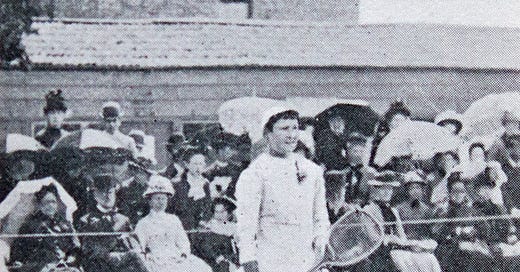They said Lottie Dod was too young. Too delicate. Too ladylike for the thwack of a tennis ball and the grit of competition. But Lottie, with her cropped hair and calm eyes, wasn’t interested in what they said. She was interested in movement. Clean, swift, sure.
Born in 1871 in Cheshire, England, Lottie grew up in a family that believed in sport. Her brothers fenced and golfed. One would become an Olympic champion. Her sister skated and hiked. And Lottie, from the age of ten, took to the tennis courts near the family home with a quiet intensity.
At fifteen, she entered her first major tournament. At sixteen, she won Wimbledon. The final match wasn’t easy. Her metal and whalebone corset dug into her side, hard enough to break the skin. She bled, but kept playing. Moved like it didn’t matter. The victory made Lottie the youngest champion in history and still the youngest ever. But she didn’t scream. Didn’t boast. She shook hands gracefully and walked off the court like she’d just done something ordinary.
Over the next few years, Lottie would win Wimbledon five times. And then at the age of twenty-one, without fanfare, she retired from the sport. Not because she couldn’t win more but because she wanted to try something else. Lottie didn’t cling to medals.
She moved on, curious and unafraid. First to archery, where just as with tennis, success came at the highest levels. Lottie made the Olympic team in 1908 and won a silver medal. Then came field hockey, where she played for the England national team. Climbing mountains in Switzerland, winning figure skating prizes in the winter followed.
In 1904, she won the British Ladies’ Amateur Golf Championship, making her the only person in history to be a national champion in tennis, golf, and archery.
Yet, though her many victories are astounding, it was never about being better than others. It was about finding joy in the doing. She wasn’t loud. She wasn’t showy. But there was this quiet revolution in every sport she touched. A woman in a time of corsets and drawing rooms and strict social rules, choosing movement and her own rules instead.
Lottie passed away in 1960, at the age of 88. In the decades that followed, sports historians would rekindle her legend. But in the stories her neighbors told, she was just Lottie. Polite. Kind. Still strong. Still smiling.
And maybe that’s the most remarkable part. Not just that she won. But that she won while being completely, wonderfully herself.
Sources:
Houghton Library, Harvard University, https://houghtonlib.tumblr.com/post/645277540905271296/harvardfineartslib-when-charlotte-lottie-dod
“June 27, 1960: The day Wimbledon starlet Lottie Dod passed away.” Tennis Majors, June 27, 2024, https://www.tennismajors.com/wimbledon-news/27-june-1960-the-day-wimbledon-starlet-lottie-dod-passed-away-421257.html
"Lottie Dod." International Tennis Hall of Fame, https://www.tennisfame.com/hall-of-famers/inductees/lottie-dod
"Lottie Dod." Wikimedia Commons, Wikimedia Foundation, https://en.wikipedia.org/wiki/File:Lottie_dod.jpg
Shaw, Susan. “‘Little Wonder’”: Lottie Dod, World’s First Female Sports Superstar. Ms. Magazine, 8/8/2020, https://msmagazine.com/2020/08/08/little-wonder-lottie-dod-worlds-first-female-sports-superstar/
“William Dod.” Olympedia, https://www.olympedia.org/athletes/575





inspirational
Remarkable by any standards!